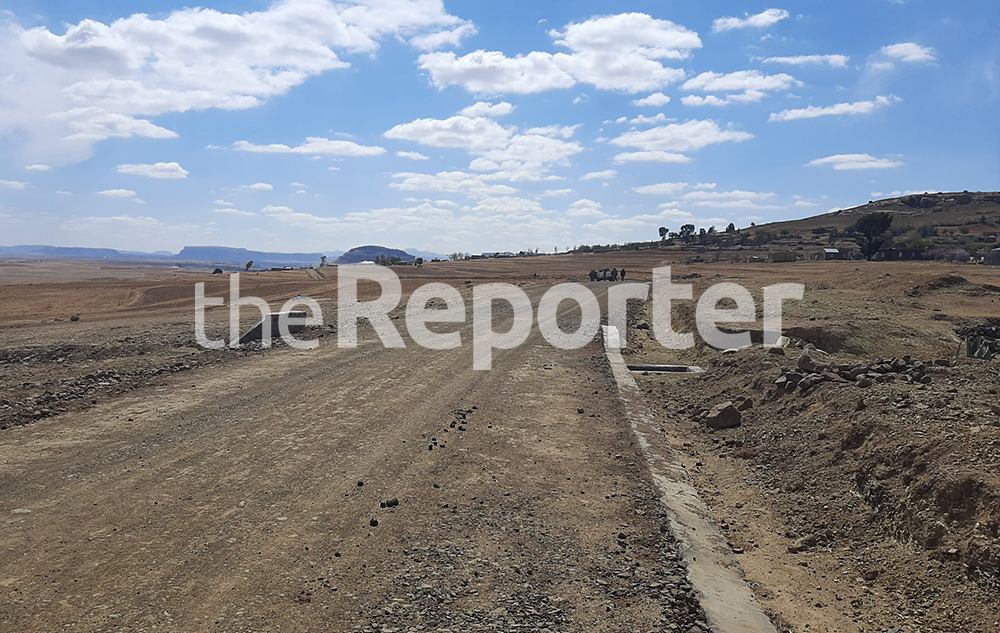By ‘Majirata Latela
As South African nationals continue to fight to be given preference for employment over foreigners in their country, a group of Lesotho truck owners and drivers took to the streets of Maseru on Wednesday to voice their displeasure at a South African rival company they accuse of encroaching on their turf.
Like many other African countries, Lesotho’s unemployment rate continues to escalate each year. On the other hand, the government which is the biggest employer has been warned of huge wage bill, making it difficult for it to continue absorbing more people.
Likewise, the private sector workforce is not so huge and in 2019 it was reported to be at 20.72 percent; the sector has a challenge of being hit hard by the economy which is also on its knees due to Covid-19. Many companies have had to retrench staff while some completely closed down.
Lesotho’s industrial sector which has absorbed at least 41.94 percent of the labour force in 2020 has also been affected by Covid-19 and had to shed thousands of jobs, with further layoffs on the horizon. With a huge chunk of jobs in the industrial sector involving cleaning, sewing, packaging and many others, truck hiring and transportation to South African harbours is one sector that seems to have attracted business minded people.
On September 24 2020, the Professional Logistics International (PLI) (PTY) LTD of neighbouring South Africa filed an urgent court case against the ministry of trade and industries, the principal secretary, the commissioner of trade and industry, and the Trading Enterprise Board, among others.
The applicant prays to the court that their licence has been virtually cancelled unlawfully, that the cancelation or suspension has resulted in daily huge economic loss to the applicant who is now unable to meet its own financial demands and contractual obligations which will lead to damage claims by its clients.
Members of the Road Freight Association of Lesotho (RFAL) were on Tuesday seen driving trucks them to the High Court to support the trade ministry in their case which was supposed to be heard that day.
Speaking to theReporter, RFAL secretary, Sechaba Thibeli said PLI – which is owned by South Africans but registered in Lesotho – was contracted by the textile factory industry to provide security to Lesotho trucks that convey containers carrying export goods to the ports of South Africa.
The company worked in that field for many years until 2019 when the local truckers learned with dismay that the South African company had bought its own fleet of trucks with the aim of elbowing Basotho owed truck hire companies out of the business and taking over the transportation industry.
“We raised the issue with the ministry of trade but due to the instability that rocked out governance systems in recent times, which saw the changing and chopping of ministers, our grievance took too long to be heard; however, we approached the ministry again last year.
“The ministry then called both parties to separate meetings, and it undertook to investigate the matter. In the meantime, it suspended the South African company’s trucking licence. However, the company disregarded the ministry’s directive and continued its business as if nothing had happened.
“These foreign companies come into our turf only to stir trouble. The ministry understood why we were complaining, and it helped us. So we are also here to return the favour and make sure that the business comes back into our hands. We did not have a problem with them working as a security company, but the only problem started in October last year when we realised that they had actually encroached into our business of transportation,” Thibeli said.
The association says it was only in February this year when suddenly they were no longer getting the job of transporting containers, that they learned that the South African company had started doubling up as transporters and ejected them from the business.
“Our truck owners suffered a lot after this as many companies failed to repay their loans; this also affected our employees; retrench some of our drivers. Not only do we as business people suffer when matters like this arise, the economy of the country also suffers as these people did not conduct their business in a transparent manner.
“When they first bought their trucks they claimed they were contracted to transport 80 containers in a month, which is highly impossible for someone who claims to have only two trucks. We took it upon ourselves to investigate how they did business, and discovered that they have many trucks on the other side of the border.
“This is their modus operandi: they use the two trucks in Lesotho to supply the other trucks in SA. What made us suspicious was the fact that you would see one truck crossing the border three to four times a week. What they were doing was being selfish; they wanted to hijack and lord over the entire business while Basotho owned companies suffer,” the president of the association Bulane None echoed.
He added that they had a similar problem in 2015 when Lesotho factory owners did not want to give the jobs to Basotho, but instead opted to buy their own trucks to do the job. They fought this move in the courts of law and won. So they are optimistic that they will prevail again.
The court ruled that PLI’s application which challenged the suspension of its license, had been overtaken by events, as the ministry had since revoked the company’s licence altogether.
Meanwhile, local business consultant Robert Likhang described the issue of citizens fighting over jobs as ‘very complex’.
“It requires the country to have policies that will outline how the country will work with foreigners. That way, foreigners and citizens will know when and why they have to fight for jobs.
“We need to change the way we do business while at same time being productive so that our countries do not end up being foreigner’s land. The reason why we end up losing some businesses to people is the way we conduct it, that needs to change.
“We need to start cooperating so that we are able to help each other see more opportunities that are aligned with the business that we are doing. We should also make it a habit of ensuring that we provide quality goods and services so that companies do not need to think twice when they offer us a job.”









